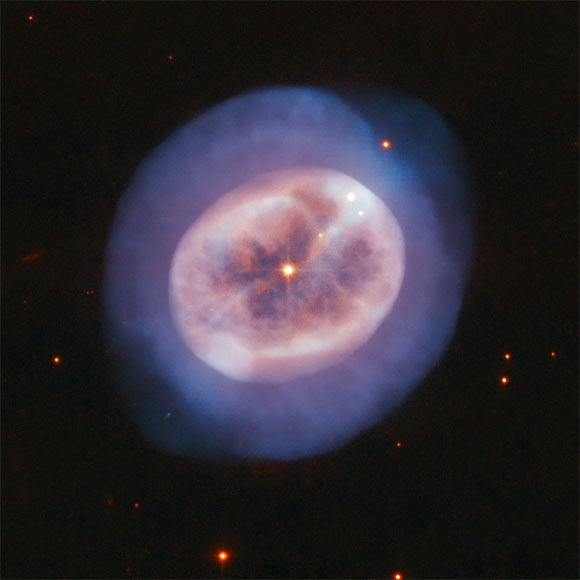Hubble Captures Beautiful Planetary Nebula Image
Aug 12, 2019 by Enrico de Lazaro
The NASA/ESA Hubble Space Telescope has produced a stunning image of NGC 2022, a vast orb of gas in space, cast off by an aging star.

This image, taken with Hubble’s Advanced Camera for Surveys (ACS), shows the planetary nebula NGC 2022. The color composite was assembled from images taken in visible and infrared light. Two filters were used to sample various wavelengths. The color results from assigning different hues to each monochromatic image associated with an individual filter. Image credit: NASA / ESA / Hubble / R. Wade.
NGC 2022 is a planetary nebula located in the constellation of Orion.
Also known as PK 196-10 1 and IRAS 05393+0903, the nebula is 8,213 light-years away from Earth.
The object was discovered on December 28, 1785 by the German-born British astronomer William Herschel.
“This type of object is called, somewhat confusingly, a planetary nebula, though it has nothing to do with planets,” said members of the Hubble science team.
“The name derives from the rounded, planet-like appearance of these objects in early telescopes.”
“When stars like the Sun grow advanced in age, they expand and glow red,” they explained.
“These so-called red giants then begin to lose their outer layers of material into space.”
“More than half of such a star’s mass can be shed in this manner, forming a shell of surrounding gas.”
“At the same time, the star’s core shrinks and grows hotter, emitting ultraviolet light that causes the expelled gases to glow.”
Thanks to: http://www.sci-news.com
Aug 12, 2019 by Enrico de Lazaro
The NASA/ESA Hubble Space Telescope has produced a stunning image of NGC 2022, a vast orb of gas in space, cast off by an aging star.

This image, taken with Hubble’s Advanced Camera for Surveys (ACS), shows the planetary nebula NGC 2022. The color composite was assembled from images taken in visible and infrared light. Two filters were used to sample various wavelengths. The color results from assigning different hues to each monochromatic image associated with an individual filter. Image credit: NASA / ESA / Hubble / R. Wade.
NGC 2022 is a planetary nebula located in the constellation of Orion.
Also known as PK 196-10 1 and IRAS 05393+0903, the nebula is 8,213 light-years away from Earth.
The object was discovered on December 28, 1785 by the German-born British astronomer William Herschel.
“This type of object is called, somewhat confusingly, a planetary nebula, though it has nothing to do with planets,” said members of the Hubble science team.
“The name derives from the rounded, planet-like appearance of these objects in early telescopes.”
“When stars like the Sun grow advanced in age, they expand and glow red,” they explained.
“These so-called red giants then begin to lose their outer layers of material into space.”
“More than half of such a star’s mass can be shed in this manner, forming a shell of surrounding gas.”
“At the same time, the star’s core shrinks and grows hotter, emitting ultraviolet light that causes the expelled gases to glow.”
Thanks to: http://www.sci-news.com






 Sat Mar 23, 2024 11:33 pm by globalturbo
Sat Mar 23, 2024 11:33 pm by globalturbo

